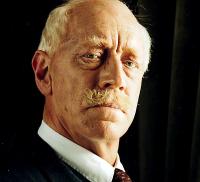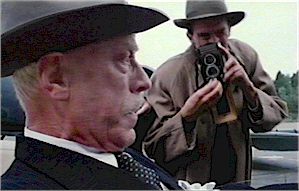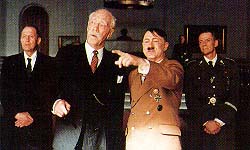 Hamsun (1996)
Hamsun (1996)Director: Jan Troell
This morning, as I got online to check my e-mail, my ISP's infotainment service, Comcast News, flashed a headline that caught my attention: "Chicken Dies, Wife Shoots Husband." Clicking through, I was greeting with the following opening paragraph:
"Chesire, Ore. - A woman shot her husband in the back after he killed her pet chicken, the Lane County sheriff's deputies said. Deputies said they were sure that Mary Gray, 58, intended to shoot her husband, Stephen Gray, 43. They weren't certain if the husband meant to fire at the chicken."
I immediately thought of Hamsun.
Like the opening of that "news" story, Hamsun begins with an old man sitting at a desk and becoming increasingly annoyed with the cluckings of a chicken in the yard outside his window. He spritely races after the beast and beats it to death with the handle of his cane. His wife runs out to examine the remains of her pet and cries bitterly that everything, even her chicken, has to be sacrificed to his genius. The old man turns and walks unrepentantly back to his room, packs his bags, and moves to a hotel for some peace and quiet to work on his new novel.
The man is Knut Hamsun (Max von Sydow), chronicler of the soul of Norway and the country's pride and joy as the winner of the 1920 Nobel Prize for Literature. The woman is Marie (Ghita Nørby), 22 years his junior, a former actress who constantly complains about giving up her promising career to marry Hamsun. She is a lonely woman who finds herself married more to an icon than a man and green with envy over his fame. The time is the late 1930s, and the specter of war in Europe has Norwegians worried about maintaining their neutrality and guarding their own safety.
Into this climate comes a man whose name is now synonymous with "traitor," Vidkun Quisling (Sverre Anker Ousdal). He is in the rural village near the Hamsuns' farm to speak about the principles of national socialism. The turnout for his talk is quite small, but one important person is in the audience--Marie. She is quite taken with the Nazi emphasis on the importance of women in nation building; she doesn't seem to take in that this role is primarily to maintain the purity of the national bloodline. Quisling actively courts Marie as a way to get to the great man himself and attempt to secure his endorsement. When Hamsun learns that Germany is against England, a country he hates for causing starvation in Norway during World War I, he signs on to the Nazi cause as well. Marie, who is fluent in German, takes frequent trips to Germany to hobnob with the Nazi elite. She thoroughly enjoys shining under her own spotlight.
 The Nazi takeover of Norway is complete by mid 1940, with Quisling at the helm and Hamsun a visible supporter in the flesh and in his editorials and letters to the editor of the nation's most prominent newspapers. It is not long, of course, until the Nazis start their systematic oppression of the Norwegians. The outcry of a sell-out among the Norwegians puts Hamsun on the defensive. He is hounded by the press, his books are thrown into the streets by his neighbors, and worst of all, his own concerns about Hitler's broken promises for Norwegian sovereignty alongside Germany worry him greatly.
The Nazi takeover of Norway is complete by mid 1940, with Quisling at the helm and Hamsun a visible supporter in the flesh and in his editorials and letters to the editor of the nation's most prominent newspapers. It is not long, of course, until the Nazis start their systematic oppression of the Norwegians. The outcry of a sell-out among the Norwegians puts Hamsun on the defensive. He is hounded by the press, his books are thrown into the streets by his neighbors, and worst of all, his own concerns about Hitler's broken promises for Norwegian sovereignty alongside Germany worry him greatly. He decides to visit the Fuhrer and meets the infamous leader in his mountain retreat, Berghof, where he is kept waiting by a scornful Hitler (Ernst
 Jacobi) and his minions. Hitler attempts to flatter and admire Hamsun into making the visit little more than a courtesy call, but Hamsun presses his cause for Norwegian sovereignty, reminding Hitler of his promises to Norway in exchange for its support. Hitler bristles and abruptly ends the visit, nearly throwing Hamsun out on his ear. Hamsun, thoroughly disillusioned, returns to Norway, Marie, and their troubled marriage.
Jacobi) and his minions. Hitler attempts to flatter and admire Hamsun into making the visit little more than a courtesy call, but Hamsun presses his cause for Norwegian sovereignty, reminding Hitler of his promises to Norway in exchange for its support. Hitler bristles and abruptly ends the visit, nearly throwing Hamsun out on his ear. Hamsun, thoroughly disillusioned, returns to Norway, Marie, and their troubled marriage.From this brief description, it would be easy to think that Hamsun is more a political history than anything else. In fact, however, the film is chiefly occupied with the dysfunctional marriage between Knut and Marie and the dysfunctional family it spawned. It is easy to imagine that Hamsun was attracted to Marie's vivacity as a contrast to his own reclusiveness, as well as her purported physical attractiveness, handsomely realized even in
 middle age by Ghita Nørby. But the marriage is a classic oil-and-water affair. A writer's life is often a solitary and selfish one into which a live wire like Marie rarely can fit. In the case of a symbol like Hamsun, the private persona can be all but obliterated. When the Hamsun children show up to try to patch their parents' marriage back together, childhood resentments against the father who was always absent, even when he was in the room, bubble up and over. Anette Hoff, as Knut's favorite child Ellinor, gives a sympathetic reading on the old man in contrast to her siblings' bitterness, but nothing seems to resolve. Eventually, Knut and Marie reunite to continue their inevitable dance until death.
middle age by Ghita Nørby. But the marriage is a classic oil-and-water affair. A writer's life is often a solitary and selfish one into which a live wire like Marie rarely can fit. In the case of a symbol like Hamsun, the private persona can be all but obliterated. When the Hamsun children show up to try to patch their parents' marriage back together, childhood resentments against the father who was always absent, even when he was in the room, bubble up and over. Anette Hoff, as Knut's favorite child Ellinor, gives a sympathetic reading on the old man in contrast to her siblings' bitterness, but nothing seems to resolve. Eventually, Knut and Marie reunite to continue their inevitable dance until death. Swedish director Jan Troell is best known, if he is known at all in places outside of Scandinavia, for his 1971 television miniseries The Emigrants. He has a real feel for Scandinavian history and manages to work an alchemy on his cast that is truly surprising, considering his two leads, von Sydow and Nørby, spoke their native Swedish and Danish, respectively, throughout filming. Jacobi as Hitler is one of the most effective screen Fuhrers I've seen, bringing his malevolence and egomania to life quickly and ferociously. Hamsun's reputation was nearly ruined in Norway because of his wartime alliance, and the film suggests that it was his naivete, ultranationalism, and insularity that may have been to blame for his choice. Nonetheless, though Hamsun seems thoroughly reviled throughout much of this picture, von Sydow takes pains to show the vulnerable and often bewildered old man beneath the prim, three-piece suit. I found Hamsun to be a singular and convincing portrait of an artist who paved his own road to hell. This husband definitely meant to kill the chicken. l


3 Comments:
At 6:02 PM, Mark said…
Mark said…
Marilyn, your range of taste in film reviews is amazing. Keep it up! In reference to the "Lèvres de Sang" review, I have never really liked the horror genre much so I'll skip this one. I do like Max Von Sydow, a man who has appeared in Conan the Barbarian and The Seventh Seal; Dune and Hannah and Her Sisters. I'll definitly watch "Hamsun" based upon your review.
P.S. I watched "The Circle" an Iranian movie about the plight of women. As much as I wanted to like it I felt it was a bit boring. I liked "Osama" more though I realize its Afghan and not Iranian.
Cheers,
Mark
At 6:56 PM, Marilyn said…
Marilyn said…
I always say, I like any movie if it's good. I do have my preferences, of course, but I try to challenge them as often as I can.
As to "The Circle," what can I say? Different strokes... Its main weakness, I suppose, is that it is agitprop. Sometimes the director is so interested in the message, that the story suffers. I, however, responded to its anger, which may have something to do with my genre and my identification with some of the injustices shown in the film.
At 6:58 AM, Hamsun 1996 said…
Hamsun 1996 said…
This is well directed movie. This is a beautifully filmed, well-acted movie; a true character study of the inner lives of a family. Highly recommended movie that you must watch ..
Post a Comment
<< Home